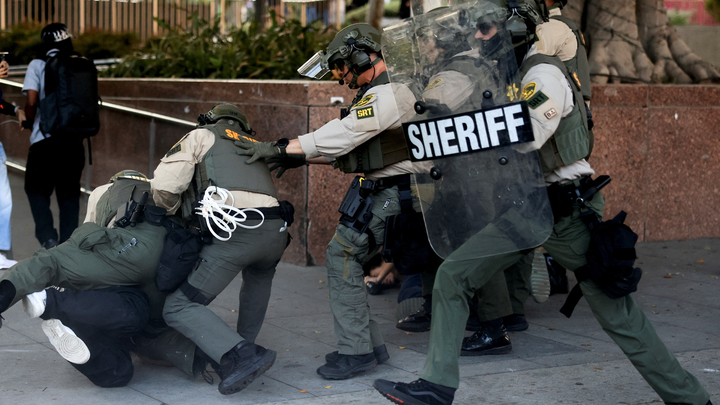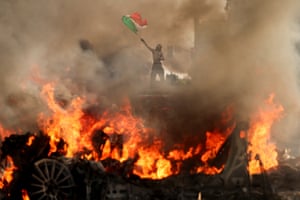
When we think of “chastisements” as pronounced in prophecy, we tend to think of great geophysical disturbances or something from space. We tend to contemplate war—and understandably so: The famous secrets at Fátima involved World War One, World War Two, a huge natural event (a tremendous display of the northern lights) and, in the most famous one, the Third Secret, some sort of disturbance to do with the earth’s axis as well as a third war.
Yet war is not always foreign; major events—as chastisement—can also come by way of domestic violence. Whether riots, law-enforcement crackdowns, or outright civil conflict, upheaval within borders can play a part of “future events.”
We saw this with riots during the 1960s and also disturbances linked to Rodney King, the looting in Ferguson, Missouri, in 2014 after a black man was killed by police, affrays in the wake of Donald Trump’s first election victory (2016), protests following the death of George Floyd, and the January 6th Capitol uprising (2021). It can come from all sides.
In his Second Inaugural Address, Abraham Lincoln presented the Civil War as a possible Divine punishment.
Fifteen years ago, in the middle of Barack Obama‘s first term, amid the rapid rise of social media, a professor at the University of Connecticut issued a stark warning: the United States was heading into a decade of growing political instability.

Now there is upheaval in Los Angeles and other cities over the apprehension of illegal immigrants, particularly violent criminal ones. The secular media claims there will be “protests” in 1,500 towns and cities this coming weekend.
We’ll see.
But as for police, the crackdown brings to mind a striking “prophecy” we focused upon in a “Special Report” seven years ago. As was related at that time:
“When it comes to the White House and alleged prophecy, perhaps the most intriguing thing in months comes not from a mystic or near-deather but a political writer, lawyer, and novelist in the late 1800s named Ingersoll Lockwood from Ossining, New York, who wrote a series of novels—two of which were for children and focused on a curious fictional character whose name—if this rings a bell—was ‘Baron Trump.’
“That was missing the second ‘r’ in the current presidential son’s first name, of course, but it seems very uncanny.
“In the old book, fictional ‘Baron Trump’ is portrayed as an aristocratically endowed young man living in a place called ‘Trump Castle.’
“That was the name, a century later, in essence, of a casino Donald Trump built in Atlantic City.
“In Ingersoll’s fiction (again, from more than a hundred years ago!), ‘Baron Trump’ is further described as having an unending imagination and an ‘active’ brain bored with the lavish lifestyle of which he is accustomed.
“In the novels, moreover, and more ironically, the boy visits Russia on an adventure that ends up shaping the rest of his life.

True stuff.
Uncanniest of all: Lockwood’s final novel, published in 1896 and about an election, describes a “state of uproar” in New York City over an outsider winning the U.S. presidency.
“Mobs of vast size are organizing under the lead of anarchists and socialists and threaten to plunder and despoil the houses of the rich who have wronged and oppressed them for so many years,” Lockwood wrote. “The Fifth Avenue Hotel will be the first to feel the fury of the mob.”
Asked the novel, “Would the troops be in time to save it?”
Of course, Fifth Avenue is where Trump Tower is located. And, of course, there were those protests after President Trump’s first election.
Unnervingly, the book was entitled The Last President.
[resources: Michael Brown’s “Special Reports“]





